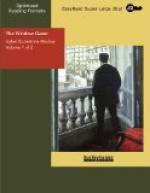Professor Spence lay and counted the drops as they fell from a knot hole in the veranda roof—one small drop—two medium-sized drops— one big drop—as if some unseen djinn were measuring them out in ruthless monotony. He counted the drops until his brain felt soggy and he began to speculate upon what Aunt Caroline would think of fried eggs for luncheon. He wondered why there were no special dishes for special meals in Li Ho’s domestic calendar; why all things, to Li Ho, were good (or bad) at all times? Would he give them porridge and bacon for dinner? Spence decided that he didn’t mind. He was ready to like anything which was strikingly different from Aunt Caroline. . . .
One small drop—two medium-sized drops—one big drop. . . . He wondered when he would know his young nurse well enough to call her by her first name? (Prefixed by “miss,” perhaps.) “Desire”—it was a rather charming name. How old would she be, he wondered; twenty? There were times when she looked even younger than twenty. But he had to confess that she never acted like it. At least she did not act as he had believed girls of twenty are accustomed to act. Very differently indeed. . . . One small drop—two medium-sized—oh, bother the drops! Where was she, anyway? Did she intend to stay out all afternoon? Was that the way she treated an invalid? . . . He couldn’t see why people go out in the rain, anyway. People are apt to take their deaths of cold. People may get pneumonia. It would serve people right—almost. . . . One drop—oh, confound the drops!
The professor tried to read. The book he opened had been a famous novel, a best-seller, some five years ago. It had been thought “advanced.” Advanced!—but now how inconceivably flat and stale! How on earth had anyone ever praised it, called it “epoch-marking,” bought it by the thousand thousand? Why, the thing was dead—a dead book, than which there is nothing deader. This reflection gave him something to think of for a while. Instead of counting drops he amused himself by strolling back through the years, a critical stretcher-bearer, picking up literary corpses by the wayside. They were thickly strewn. He was appalled to find how faintly beat the pulse of life even in the living. Would not another generation see the burial of them all? Was there no new Immortal anywhere?
“When I write a novel,” thought the professor solemnly, “which, please God, I shall never do, I will write about people and not about things. Things change always; people never.” It was a wise conclusion but it did not help the afternoon to pass.
Desire, that is to say Miss Farr, had passed the window twice already. He might have called her. But he hadn’t. If people forget one’s very existence it is not prideful to call them. And the Spences are a prideful race. Desire (he decided it didn’t matter if he called her Desire to himself, she was such a child) was wearing— an old tweed coat and was carrying wood. She wore no hat and her hair was glossy with rain. . . . People take such silly risks—And where was Li Ho? Why wasn’t he carrying the wood? Not that the wood seemed to bother Desire in the least.




